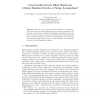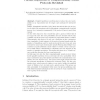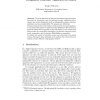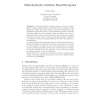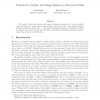115
click to vote
TCC
2007
Springer
15 years 7 months ago
2007
Springer
Abstract. We show a new protocol for blind signatures in which security is preserved even under arbitrarily-many concurrent executions. The protocol can be based on standard crypto...
TCC
2007
Springer
15 years 7 months ago
2007
Springer
Abstract. We present a public-key encryption scheme with the following properties. Given a branching program P and an encryption c of an input x, it is possible to efficiently com...
121
click to vote
TCC
2007
Springer
15 years 7 months ago
2007
Springer
Abstract. An obfuscation O of a function F should satisfy two requirements: firstly, using O it should be possible to evaluate F; secondly, O should not reveal anything about F th...
TCC
2007
Springer
15 years 7 months ago
2007
Springer
Abstract. Parallel repetition is well known to reduce the error probability at an exponential rate for single- and multi-prover interactive proofs. Bellare, Impagliazzo and Naor (1...
TCC
2007
Springer
15 years 7 months ago
2007
Springer
Abstract. Algorithmic progress and future technology threaten today’s cryptographic protocols. Long-term secure protocols should not even in future reveal more information to a�...
TCC
2007
Springer
15 years 7 months ago
2007
Springer
We investigate whether security of multiparty computation in the information-theoretic setting implies their security under concurrent composition. We show that security in the sta...
TCC
2007
Springer
15 years 7 months ago
2007
Springer
120
click to vote
TCC
2007
Springer
15 years 7 months ago
2007
Springer
Assume that two distant parties, Alice and Bob, as well as an adversary, Eve, have access to (quantum) systems prepared jointly according to a tripartite state ρABE. In addition, ...
124
click to vote
TCC
2007
Springer
15 years 7 months ago
2007
Springer
Abstract. In an identity based encryption scheme, each user is identified by a unique identity string. An attribute based encryption scheme (ABE), in contrast, is a scheme in whic...
TCC
2007
Springer
15 years 7 months ago
2007
Springer
We construct public-key systems that support comparison queries (x ≥ a) on encrypted data as well as more general queries such as subset queries (x ∈ S). These systems support...
